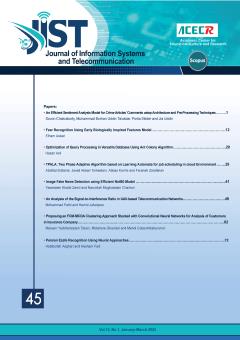Today, increased competition between organizations has led them to seek a better understanding of customer behavior
through innovative ways of storing and analyzing their information. Moreover, the emergence of new computing
technologies has brought about major change
More
Today, increased competition between organizations has led them to seek a better understanding of customer behavior
through innovative ways of storing and analyzing their information. Moreover, the emergence of new computing
technologies has brought about major changes in the ability of organizations to collect, store and analyze macro-data.
Therefore, over thousands of data can be stored for each customer. Hence, customer satisfaction is one of the most
important organizational goals. Since all customers do not represent the same profitability to an organization,
understanding and identifying the valuable customers has become the most important organizational challenge. Thus,
understanding customers’ behavioral variables and categorizing customers based on these characteristics could provide
better insight that will help business owners and industries to adopt appropriate marketing strategies such as up-selling
and cross-selling. The use of these strategies is based on a fundamental variable, variety of products. Diversity in
individual consumption may lead to increased demand for variety of products; therefore, variety of products can be used,
along with other behavioral variables, to better understand and categorize customers’ behavior. Given the importance of
the variety of products as one of the main parameters of assessing customer behavior, studying this factor in the field of
business-to-business (B2B) communication represents a vital new approach. Hence, this study aims to cluster customers
based on a developed RFM model, namely RFMV, by adding a variable of variety of products (V). Therefore, CRISP-DM
and K-means algorithm was used for clustering. The results of the study indicated that the variable V, variety of products,
is effective in calculating customers’ value. Moreover, the results indicated the better customers clustering and valuation
by using the RFMV model. As a whole, the results of modeling indicate that the variety of products along with other
behavioral variables provide more accurate clustering than RFM model.
Manuscript profile


